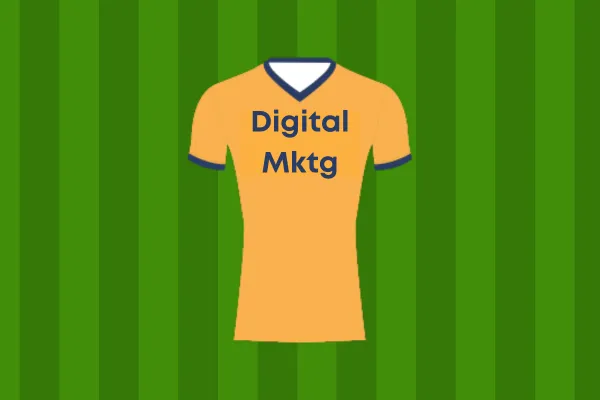

Your Field of Businesss
Where small, incremental improvements can create big, long standing results

Digital Marketing Strategy Northamptonshire: Turning Online Activity Into Real Business Growth
Most small business owners know they “should be doing more online,” but few have the time, or a clear plan to make sense of it all.
Between social media, SEO, websites, and email campaigns, it’s easy to feel like digital marketing is a never-ending list of things to do.
If you’ve ever wondered how to make your digital marketing actually work for your business, you’re in the right place.
In The Field of Business model, your Digital Marketing position sits in the midfield, the engine room that connects your brand strategy with your sales results.
When this position plays well, your business gains momentum. When it’s out of sync, your efforts feel scattered and your message gets lost.
⚽ The Field of Business: Digital Marketing as Your Midfield Playmaker
The Field of Business model uses a 3-2-3-2 football formation to map your entire company.
Defence keeps you in control — Systems, Finance, People.
Attack drives growth — Sales and Client Management.
Midfield creates flow — Branding, Digital Marketing, and Personal (offline) Marketing.
Digital Marketing is your left midfielder, responsible for building awareness, engagement, and trust online. It supports your forwards (Sales and Client Management) by generating opportunities and strengthening relationships.
When this position is well-organised, your business feels like a coordinated team instead of a collection of disconnected tactics.
🧭 What Is a Digital Marketing Strategy?
A digital marketing strategy is your plan for how you’ll use online tools and channels to attract, nurture, and convert your ideal customers.
It’s not about doing everything. It’s about choosing the right things, and doing them consistently.
A good strategy answers three key questions:
1️⃣ Who do we want to reach?
2️⃣ What do we want them to know, feel, or do?
3️⃣ How will we get their attention and earn their trust?
Without strategy, digital marketing becomes noise. With strategy, it becomes a system that drives growth predictably and sustainably.
💡 Why Local Businesses Need a Clear Digital Strategy
Northamptonshire is home to thousands of small and growing businesses, creative agencies, consultants, manufacturers, accountants, and trades.
Many do brilliant work, but rely too heavily on word-of-mouth or social posts without clear purpose.
A well-structured digital strategy helps you:
✅ Be found by people actively looking for your services.
✅ Stay visible to existing and potential clients.
✅ Build credibility and trust before the first conversation.
✅ Generate consistent leads without relying solely on networking.
It’s not about being everywhere, it’s about being effective where it matters.
🔧 The Core Components of a Digital Marketing Strategy
1️⃣ Website: Your Online Home
Your website is your digital headquarters. Everything else, social media, email, ads should drive traffic back there.
A good website should:
Clearly explain who you help and how.
Showcase your services and testimonials.
Include calls to action (enquire, book a call, download).
Load fast and look great on mobile.
Think of your website as your online version of the Business Dashboard, the place you measure what’s working and where visitors convert into clients.
2️⃣ Search Engine Optimisation (SEO): Be Found When It Matters
If your ideal client types “digital marketing strategy Northamptonshire” or “business mentoring near me,” will your website appear?
SEO helps make sure it does.
Focus on:
Using local keywords naturally (like your town or county).
Creating helpful, valuable content that answers real questions.
Ensuring each page targets one clear topic.
Earning links from reputable local directories or partners.
Good SEO compounds over time. It’s not instant, but the results can transform your visibility and lead quality.
3️⃣ Social Media: Building Connection, Not Just Content
Social media isn’t just about posting, it’s about positioning.
Choose platforms that make sense for your audience. You don’t need to be on all of them.
For most Northamptonshire businesses, LinkedIn, Facebook, and Instagram are strong starting points.
Use them to:
Share valuable insights, not just promotions.
Tell real stories about your clients or process.
Invite conversation instead of broadcasting.
Remember: consistency beats intensity. One meaningful post each week is better than a flood followed by silence.
4️⃣ Email Marketing: Your Direct Line to Clients
Social media algorithms change, but your email list is yours.
A monthly newsletter or nurture sequence builds familiarity and trust over time.
Use email to:
Share practical tips.
Announce offers or events.
Reconnect with past clients.
Drive traffic to blogs or downloads.
Even a simple, well-written monthly update keeps your brand top-of-mind, especially for those not ready to buy yet.
5️⃣ Analytics: Measure What Matters
You can’t improve what you don’t measure.
Review these key metrics monthly:
Website visitors and enquiry conversions.
Social media engagement.
Email open and click-through rates.
Cost per lead (if running ads).
Your data is your coach, it shows where you’re winning and where to improve next.
🔄 Connecting Digital Marketing With the Rest of the Field
In The Field of Business, no position works in isolation.
Digital Marketing connects directly to:
Branding, ensuring consistent message and tone.
Sales, providing warm, qualified leads.
Client Management, supporting long-term engagement through updates and education.
When all three areas align, your online activity feels purposeful and joined-up.
When they don’t, you end up with random acts of marketing, busy, but not effective.
💬 Case Study: A Northamptonshire Business That Simplified Its Strategy
A local business was active on multiple social media platforms, sending occasional emails and updating their website sporadically. Despite all this activity, they weren’t seeing steady enquiries.
After reassessing their Field of Business Digital Marketing position, they simplified their focus:
Defined their ideal audience clearly.
Rebuilt their website around a single message and clear calls to action.
Focused content on client pain points and real results.
Created one weekly post and one monthly newsletter.
Within three months, website enquiries doubled, without increasing their workload.
They didn’t do more marketing. They did better marketing.
🧠 The 1% Rule of Marketing Refinement
Like every position in The Field of Business, digital marketing thrives on small, consistent improvements.
If you refined one element of your online presence by just 1% each week, you’d be 64% stronger by year-end.
That might look like:
Updating one website headline.
Adding one keyword-optimised blog.
Improving one call to action.
Repurposing one social post into an email.
Over time, those tiny tweaks build unstoppable momentum.
💬 Why Strategy Beats Trend-Chasing
Digital marketing evolves fast — new platforms, algorithms, and “must-do” tactics appear constantly. But the fundamentals stay the same:
🎯 Clear audience
📣 Consistent message
💡 Valuable content
📆 Regular activity
📊 Measurable results
When you stay focused on strategy over trends, you save time, reduce stress, and create results that last beyond the latest fad.
🧑🏫 The Role of Mentors and Masterminds
Digital strategy can be overwhelming, especially when you’re trying to balance everything else.
That’s why working with a business mentor or joining a business mastermind group in Northamptonshire can make a huge difference.
They help you:
Focus on what’s most effective for your goals.
Build accountability for consistent action.
Interpret data and refine strategy intelligently.
Stay confident in your message and direction.
Every top performer, on and off the pitch, has a coach or team that helps them see clearly and play smarter.
📍 Why Digital Marketing Strategy Matters in Northamptonshire
Northamptonshire’s business community is thriving, but also competitive. Whether you’re in Northampton, Kettering, Corby, or Towcester, your potential clients are searching online for local experts daily.
A clear, consistent digital marketing strategy ensures they find you — and that when they do, they immediately see why you’re the right choice.
It builds visibility, credibility, and connection — three essentials for sustainable growth.
🏁 Final Whistle: Digital Marketing That Works for You
If you’ve been searching for digital marketing strategy Northamptonshire, remember: success isn’t about doing everything. It’s about doing the right things, well and consistently.
Here’s your Field of Business game plan:
1️⃣ Review your online presence — is your message clear and consistent?
2️⃣ Simplify your focus to 2–3 core channels.
3️⃣ Create regular, value-driven content.
4️⃣ Measure, review, and refine monthly.
5️⃣ Stay strategic — not reactive.
Digital marketing shouldn’t drain your time; it should multiply your results.
With clarity, consistency, and small weekly improvements, your online presence becomes a reliable engine for growth, one that works even when you’re not.
Because in the Field of Business, Digital Marketing isn’t just about clicks, it’s about connection, credibility, and conversion.

